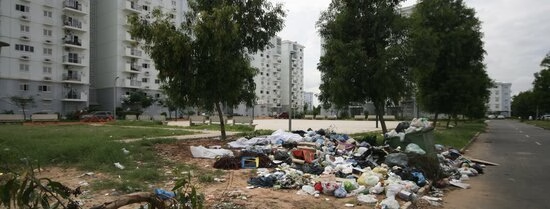The New Towns in development across the African continent since 1990 are overwhelmingly designed and built according to old urban planning models from the previous century (Watson 2013; INTI 2017). Although these typologies range from functionalist Chinese grids to American gated communities, the results are—with notable exceptions—New Towns with rigid physical infrastructure and strict building regulations, that do not support spatial manifestations of the ‘informal’ sector such as kiosks, spatial appropriation or mass transport. As a result, these New Towns become insular enclaves and informal settlements develop adjacently to them, but without access to the same services and amenities offered within the New Town (Provoost and Keeton 2017).
Coupled with the implicit vulnerabilities of emerging and threshold economies, the rigidity of the imported urban models exacerbates spatial segregation at an urban scale. Additionally, contemporary New Town models do not take current climate variability or future climate change threats into account. As implemented in the African context, they rarely respond effectively to surrounding natural landscapes or environmental sensitivities.
Building on the arguments that equal access to resources is a key component of sustainable development (WCED 1987), and that urban planning benefits from new linkages between critical social theory and environmental science (Fainstein and Campbell 2012), this research proposes that applying adaptive urban planning principles to New Towns in the African context can increase ecological sustainability and social inclusivity. The objective of this research is therefore to address the spatial challenges of African New Towns by developing an alternative planning and design approach that acknowledges both social and environmental dimensions, as well as the constant state of change that all cities exhibit. To do so, this research develops and applies two sets of adaptive spatial planning principles that address the different capacities, requirements and resources of planning institutions (structure) and residents (infill).
Notably, most authors examining this phenomenon (Watson 2014; Murray 2017) primarily employ internet sources to build their arguments, which can be problematic in the African context where remotely sourced data is often unreliable or non-existent. This research uses a combination of empirical evidence acquired during fieldwork and literature review to support its claims. It also contributes to the current debate on normative assumptions regarding planning in the Global South (Watson 2002; Watson 2016; Cirolia and Berrisford 2017).
- More information
About the lecturer
Rachel Keeton is an urban researcher and founder of Urban Anecdote, a research office concerned with questions about the city. An architect by training, Keeton has worked in the field of urban analysis for the last ten years, specializing in contemporary new towns around the world. As a researcher for the International New Town Institute (INTI), she initiated and led INTI's satellite program in Nairobi, Kenya. She is a co-editor of the forthcoming book To Build a City in Africa: A History and a Manual (Nai010, 2018), and author of Rising in the East: Contemporary New Towns in Asia (SUN, 2011). She lectures regularly at international venues such as the Shenzhen-Hong Kong Bi-city Biennale, the Canadian Centre for Architecture and UN Habitat Expert Group Meetings. In 2016 she was the recipient of a Delft Global Development Fellowship. Keeton is currently pursuing a PhD in urbanism at TU Delft, under the Design as Politics chair.
